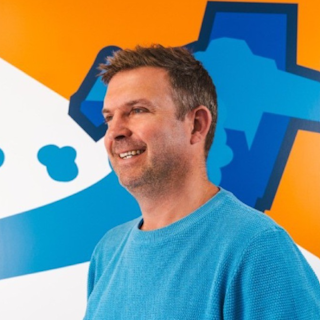Listen to your heart, not healthtech, if you want to live longer
From fat busting to FitTok, everyone can tell you how to live a healthier life, but only you can actually make it happen. Harry Lang discusses the dangers of health misinformation.

There should be a government-sponsored service that tells you how to handle the next decade as you hit your 30th, 40th, 50th and 60th birthdays. A bullet point memo would neatly summarize the learnings and wisdom of millions of humans who have completed said decade.
It could cover all the big topics - health, work, mindfulness, ethics, parenting, money, politics, sex and maybe a bonus segment on having fun. We won't bother the 70-year-olds - if they haven’t got things pretty sorted by then, they’re either extremely good, extremely lucky, or hopeless at taking advice.
If I could send such a memo to a younger self, I’d have suggested looking after my back a little better, perhaps getting back into Pilates and stretching. It almost certainly would have warned me that my eyesight might deteriorate if I spent the next decade staring at a screen all day. A balanced diet would have been mentioned, and the dreaded IBS. And that’s not mentioning sleep, I'd want more than five hours a night despite my daughter’s attempts to turn me nocturnal.
I suspect none of the guidance would have suggested following a plethora of health and fitness influencers and then ingesting a bunch of synthetic weight-loss drugs. But that’s what we’re all being told to do constantly in 2024.
Half the problem, as it tends to be, is about money, while the other half is about human frailty.
I could write the most effective weight loss book in history titled ‘Eat Better, Don’t Drink, Avoid Sugar, Exercise More,’ but unfortunately, there would be little else to say beyond that title. Sure, this method would require effort, discipline and take away some things people like. And there would be little for anyone else to profit from. This reminds me - I DID publish that exact diet book as a joke during lockdown. You can buy it on Amazon here (don’t though).
Instead of pragmatic and truthful reasons, we’re treated to a daily tsunami of trite fitness content and snake oil poured through the constant enema of digital media.
Let’s take a look back at a snapshot to November 2022, when TikTok was popularizing some of its more ludicrous health trends:
-
Rice water hair - users were cautioned to be careful with the rice water trend, arguing it can also cause hair breakage depending on your hair type.
-
Benadryl challenge - Johnson & Johnson, which manufactures the drug, released a statement noting it was “extremely concerning” and “should be stopped immediately.”
-
Nature’s cereal recipe - literally just cereal with fruit in it, but with added, yet ill-defined ‘benefits.’
-
Sunscreen contouring - giving the perception of a toned physique using *checks notes* ‘sunburn.’
-
12-3-30 workout - just exercising for an exact amount of minutes.
-
Chlorophyll - drinking the stuff from plants because - and there is zero scientific evidence to back this up - it gives you lovely skin. Those plants sure are lovely.
-
NyQuil Chicken - Literally Darwinism personified. I’ll say no more.
-
Proffee (Protein + coffee) - at this stage, creators had worked out that more insane = more likes.
-
Dry-scooping workout powder - I mean, if you want to bulk up, then fine, but it says ‘add protein powder to water on the packaging. Eating it dry and can “...lead to heart palpitations, lung infections if the powder is accidentally inhaled, and digestive problems”.
-
Lemon coffee - they say this aids weight loss.
The trends got worse. Today, online health trends are omnipotent; even everyone’s formerly favorite entrepreneur, Steven Bartlett, has been drinking the Kool-Aid.
When he’s not espousing the virtues of various protein shakes, he’s sullying his credibility as a brand ambassador for health tech brand Zoe, which claims its “...home test kit can provide comprehensive insights into your biology, covering the gut microbiome and your blood sugar and blood fat responses”.
Says Steven on Zoe’s website: “There’s an incredible correlation between what I’ve eaten, my blood glucose levels, and how I’m feeling.” …this must be a contender for the 2024 ‘No shit, Sherlock’ award.
Good health is important, obviously, or more accurately, it’s vital if we’re planning to stay vertical past retirement age.
As with all vital things in the world, it’s being monetized to the max.
This is because actual healthcare has become unaffordable, and fake healthcare products are being sold with little real thought as to whether they actually work.
If you were ever in doubt as to how obscenely valuable the wellness industry has become, a report by Bloomberg in November 2023 (quoting The Global Wellness Institute) makes for gut-wrenching reading, stating that it made $5.6trn in revenue in 2022. Research from the GWI said the industry “...is expected to grow an additional 57%, to $8.5trn” by 2027.
Eight point five trillion dollars.
That’s just over three Apples, or four and a half Alphabets, and because health, wellness, nutrition, meditation and athleisure trends are designed as quick fixes for perceived physical and mental problems, are incredibly sellable on social media.
I wrote in these pages last month about Big Social’s hold over society, especially young people. In the digital health market, women have been targeted, in particular, flagged in a recent BMJ report about how corporations co-opt feminist narratives to promote non-evidence-based health interventions. The report states that “...promoting healthcare interventions that are not supported by evidence… “...increases the risk of harm to women through inappropriate medicalization, overdiagnosis, and overtreatment”.
In short, women are being aggressively sold health products, medication and treatments that are not only useless for them, they might actually be dangerous. So for my 50th, I’d hope ignoring these charlatans would be the top tip in any health memo.
Harry Lang is VP of marketing at game developer and publisher Kwalee and author of ‘Brands, Bandwagons & Bullshit,’ available on Amazon. You can find Harry at @MrHarryLang and connect with him on LinkedIn.
